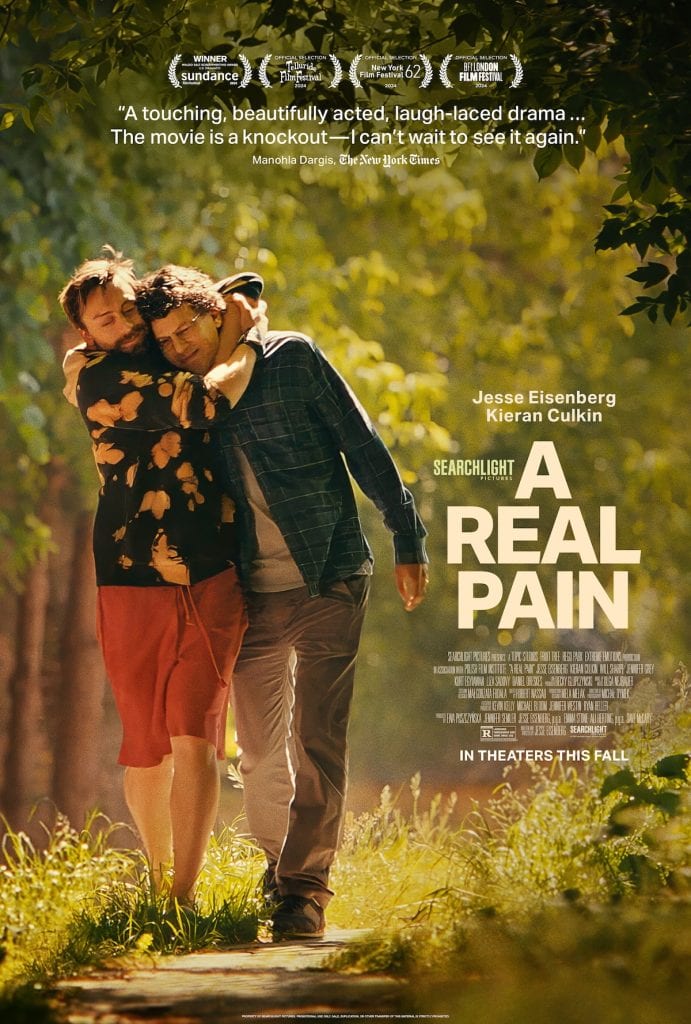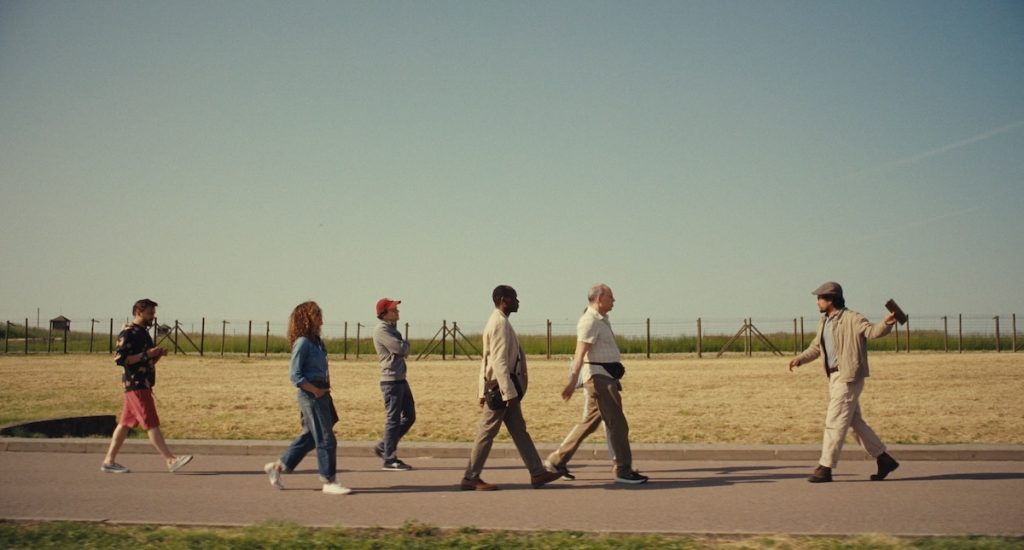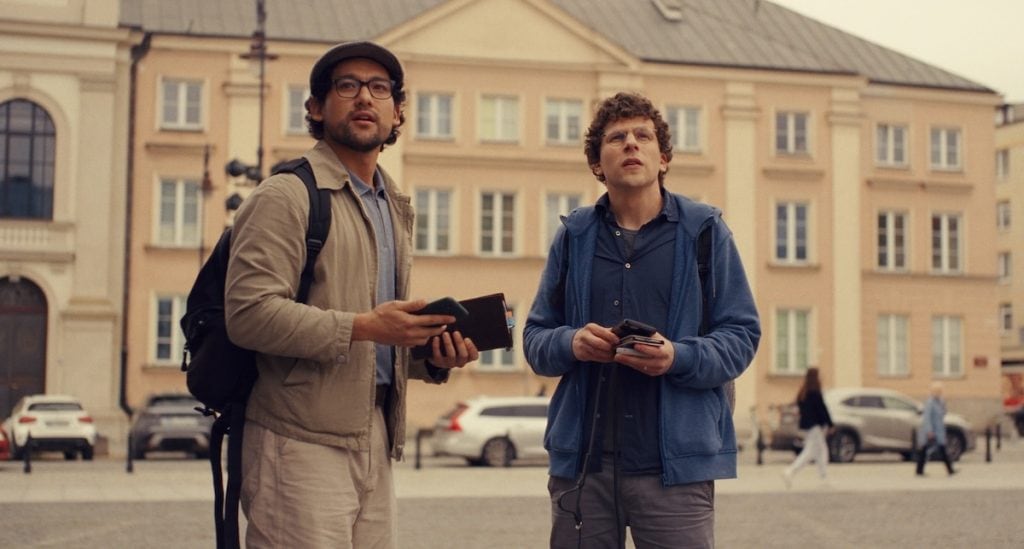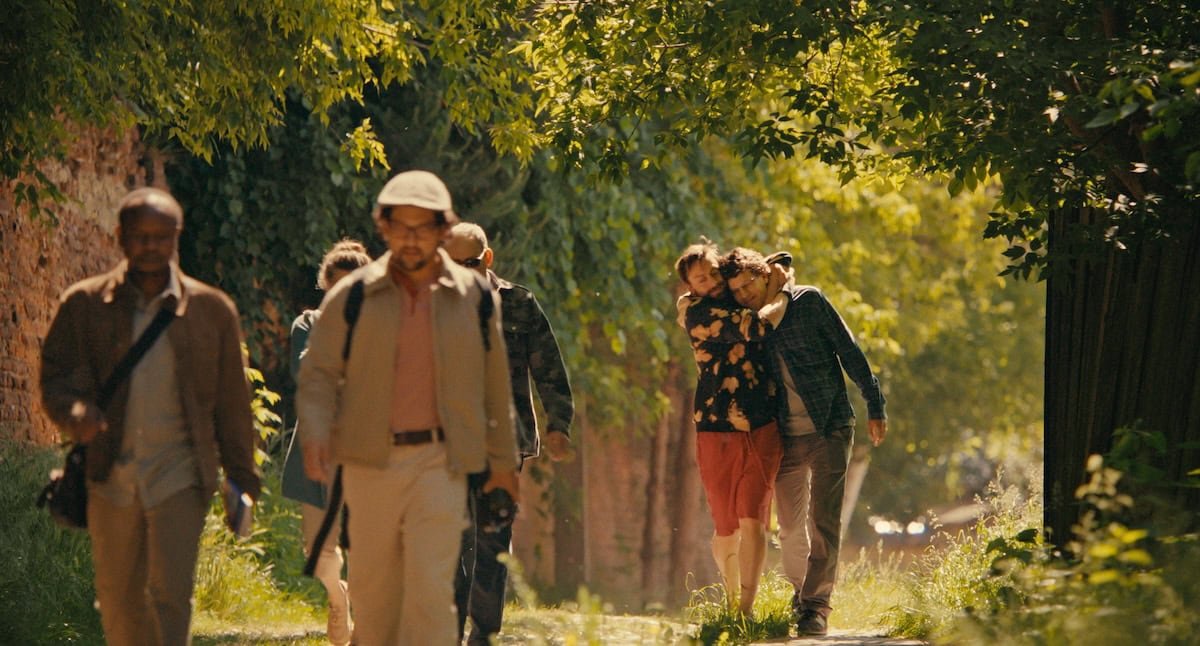When critics praise a movie like A Real Pain, the new film by Jesse Eisenberg, or go as far as to call it “a masterpiece,” I’m unsure as to whether I should question the critics or question myself because I’m not sure if we saw the same movie. A Real Pain was a bit of a disaster of a movie in my book.

I see a lot of films, both good and bad, and enjoy the process of watching them even if I don’t love them. I love the art of filmmaking and can appreciate anything from a Hollywood blockbuster to a small arthouse film. But the movies I love have something in common. It’s typically really good characters, a really good story, or, in a perfect world, both. A Real Pain had neither.
Written and directed by Jesse Eisenberg, it’s the story of two mismatched and mostly estranged cousins that reunite after the death of their beloved grandmother to visit her homeland of Poland. Kieran Culkin plays the free-spirited but emotionally fraught Benji with Eisenberg as his straight-laced, uptight yet responsible cousin David. Sounds like a modern day odd couple.

Now take this overused trope and set in amongst a older tour group visiting historical parts of Poland, including the Majdanek concentration camp outside Lublin. Yes, it’s a heavy subject material sandwiched in between the unpredictability of Benji’s behavior and the tension-wrought relationship between the cousins. It’s a movie that wanted to go so many places but never made it to any.
In A Real Pain, we never see any growth of the characters. David doesn’t learn to relax his life a little more and live in the present. Benji doesn’t learn to consider anyone other than himself when expressing his emotions. And even if the characters don’t grow, we don’t really see the relationship grow or change either.
Without strong characters, we’re left wanting a meaningful story and we never really get that either. David and Benji meet up with a small tour group in Poland led by British tour guide James, played wonderfully by Will Sharpe of The White Lotus fame. Group members include midwest couple, Mark and Diane, who are mostly forgettable, recent divorcee Marsha (played by Jennifer Grey), and an African Canadian named Eloge (played by Kurt Egyiawan) who is a convert to Judaism and one of the more interesting characters.

As the group heads out on a tour together, we’re unsure if this is a ensemble cast or a buddy pic and I think the movie doesn’t really know either. There’s potential for everyone to learn from each other but that never happens. Again and again, we’re subjected to Benji’s emotional outbursts and while it seems like they are designed to “make us think,” they just seemed to make us angry.
Towards the end of the tour, Benji and David leave early for a side trip to visit their grandmother’s home, which is neither impactful nor eventful. And we’re left wondering why the tour was even part of the storyline in the first place. David and Benji then head home, part ways, and we’re wondering why we watched this movie in the first place.
In the end, there were a few bright spots. The acting by the entire cast was well done. As unlikable as most of the characters were, they were played well, most notably Kieran Culkin and Will Sharpe, as mentioned above. The timing of the film is also relevant as we need more reminders of atrocities that were committed against the Jews in World War II. I appreciated being able to have a glimpse inside a concentration camp and hope that it gave some viewers a reason to pause. But unfortunately, it failed to make the emotional impact that I was hoping for.

I should note that much of this story is based on Eisenberg’s real life experiences, with his relatives having lived in Poland during the Holocaust, in the exact house where his character’s grandmother lived. I can imagine that this was a big and important movie for Eisenberg personally but the story failed to bring us along for the journey.
I will admit to reading a few reviews before sharing my thoughts. Some mention that the intention of this film in tackling such a intense subject amidst the familial mess of the cousin’s relationship is to show how removed the third generation of immigrants are from the tragic history of their relatives. Some have mentioned it’s a journey they themselves are undertaking and how the film resonates with the millennial Jew. But if that’s their target audience, it’s going to have success on a small scale.



The only realistic part of this movie was the accurate portrayal of a bi-polar person. I don’t find that entertaining in the slightest. Even that was over the top. Maybe that’s what Jesse Eisenberg wanted from Kieran Culkin. Eisenberg, as other reviewers have pointed out, played Eisenberg, as he always does, and as usual, he wasn’t very interesting.
The movie was utterly predictable and otherwise lacking in any depiction of reality. From the moment Eisenberg says he wants to take a shower, you knew Culkin would get in there first. The dynamic between the two of them was obvious from their first scene together at the airport, and despite any childhood closeness we’re told about no one would tolerate Culkin.
In real life, Eisenberg would never have agreed to this trip. In real life, the tour group would have voted Culkin off the island either after his first F-bomb, or the minute he started his first rant. Culkin would have been thrown off the train and possibly carted off to the psych ward. Tour group members would have been demanding their money back. Instead, they all might as well have been robots who didn’t quite get their full dose of artificial intelligence.
The overwhelmingly positive reactions from professional critics are troubling. Undoubtedly some of them just like Acting with a capital A. Unfortunately, I suspect a lot of them are displaying a knee-jerk reaction to any movie that features a person with a disability or the Holocaust, because it’s fashionable. As if neither has been done before, and much better. It was a transparent ego trip for the two leads and it’s a mystery why critics feel they have to indulge either of them.
Last, but certainly not least, was the criminal misuse of Chopin in a soundtrack as overbearing as the main character.
Couldn’t agree more. For me, this was a banal and almost embarrassing movie.
All I can say is “Really?”